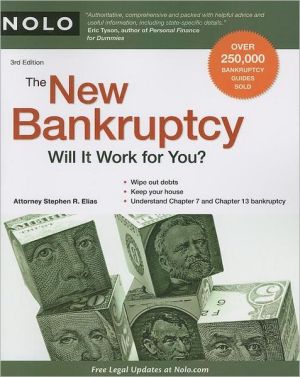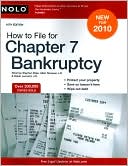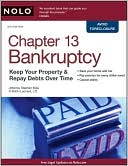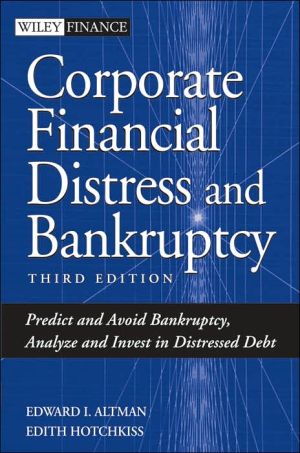The New Bankruptcy: Will It Work for You?
The most up-to-date book available for people considering filing for Chapter 7 or Chapter 13 Bankruptcy under the major new reforms.Features\ Everything readers need to know about filing for bankruptcy under the new laws. The 1st edition reflects the latest bankruptcy rules, including changes in your state's exemption laws that let you protect your property.Written in plain English, Bankruptcy examines the pros and cons of filing for bankruptcy, discusses its possible repercussions, outlines...
Search in google:
Considering bankruptcy? Get the facts and find out how bankruptcy could work for you.Bankruptcy laws have changed, and figuring out how to use them effectively is harder than ever. For plain-English guidance you can trust, turn to The New Bankruptcy.Get the clear-cut answers, information and strategies you need to figure out whether bankruptcy is the right solution for your debt problems. Eric Tyson "Authoritative, comprehensive and packed with helpful advice and useful information, including state-specific details."--(Eric Tyson, best-selling author of Personal Finance for Dummies and Mind Over Money)
Intro\ If you've picked up this book, you probably have more debt than you can handle. Most likely, your debt mushroomed because of circumstances beyond your control -- job loss, divorce, business failure, illness, or accident. You may feel overwhelmed by your financial situation, and uncertain about what to do next. Maybe a friend, relative, or even a lawyer suggested bankruptcy, describing it as the best thing in the world for you. Someone else may have said the opposite -- that bankruptcy is a huge mistake and will ruin your life.\ This book will help you sort through your options and choose the best strategy for dealing with your debts. It explains:\ \ how the new bankruptcy law works\ how filing for bankruptcy under Chapter 7 or Chapter 13 (the two bankruptcy options for consumers) will affect your debts, property, home, and credit\ the procedures you'll have to follow (and paperwork you'll have to complete) to file for bankruptcy, and\ some alternative ways to handle your debt problems, outside of the bankruptcy system.\ \ \ \ Armed with this information, you'll be ready to decide whether filing for Chapter 7 or Chapter 13 bankruptcy makes sense for you.\ As you consider the strategies available to you, keep in mind that you're not alone. During each of the first five years of the new millennium, more than 1.5 million Americans filed for bankruptcy. So did thousands of companies. Although filings dropped dramatically just after the new law took effect, bankruptcy remains a necessary and pervasive part of our economic system.\ And bankruptcy may be right for you. You may be able to stop creditor collection actions(such as foreclosures, wage garnishments, and bank account levies) and:\ \ wipe out all or most of your debts in a Chapter 7 bankruptcy while hanging on to your home, car, and other necessary items, or\ \ \ use Chapter 13 bankruptcy to pay back a portion of your debts over three to five years.\ \ \ \ If your debts are overwhelming and your creditors are hounding you, bankruptcy may seem like a magic wand. But bankruptcy also has its drawbacks. And, because everyone's situation is a little bit different, there is no one-size-fits-all formula that will tell you whether you absolutely should or should not file. For many, the need for and advantage of bankruptcy will be obvious. Others will be able to reach a decision only after closely examining their property, debts, income, and recent financial transactions -- and how persistent their creditors are. For some, simple non-bankruptcy options might do the trick -- these are explained in Ch. 11 of this book.\ This chapter provides some basic background information about the two types of bankruptcies most often filed by individuals: Chapter 7 and Chapter 13. In the chapters that follow, you'll find more detailed information on the issues you are likely to face under the new bankruptcy\ law, including:\ \ whether you are eligible to file\ which debts will and will not be cancelled\ what will happen to your home, car, and other essential property items\ how your post-bankruptcy credit will be affected,\ how bankruptcy will affect your personal life, and\ whether you need to be represented by a lawyer or can represent yourself, perhaps with some outside help.\ \ \ \ Bankruptcy laws have changed.\ As you know from this book's title, Congress recently made big changes to the bankruptcy laws -- and these changes will affect the filing options and decisions of many readers. One major new requirement has to do with eligibility: Filers with higher incomes (as measured against the\ median family income for their state) may not be allowed to file for Chapter 7 at all, and will have to pay back more of their debts, over a longer period of time, if they file for Chapter 13. (You can find more on these requirements in Ch. 2.) And this is just one of the many changes. The new law leaves few areas of bankruptcy untouched, so you shouldn't assume that anything you thought you knew about bankruptcy before October 2005 is still correct: You may be unpleasantly surprised. The most important changes are described at the end of this chapter; each subsequent chapter concludes with a brief summary of the new rules covered in that chapter.\ [Icons Used in This Book Sidebar] omitted for online sample chapter.\ Types of Bankruptcy \ There are two kinds of bankruptcy: "liquidation" and "reorganization." In a liquidation bankruptcy (referred to as a Chapter 7 bankruptcy because of its location in the Bankruptcy Code), some of your property might be sold (liquidated) to pay down your debt; in exchange, most or all of your debts will be wiped out. Individuals can file for Chapter 7 (a "consumer" Chapter 7 bankruptcy) as can businesses (a "business" Chapter 7 bankruptcy). A Chapter 7 bankruptcy typically lasts three to six months.\ In a reorganization bankruptcy, you devote part of your income to paying down your debt over time. There are three different kinds of reorganization bankruptcies:\ \ Chapter 13 bankruptcy is for individuals only.\ Chapter 11 bankruptcy is for businesses and for individuals with very large debts.\ Chapter 12 bankruptcy is for individuals whose debts come mainly from the operation of a family farm.\ \ \ \ This book focuses exclusively on consumer Chapter 7 bankruptcies and Chapter 13 bankruptcies. However, Chapter 11 and Chapter 12 bankruptcies are briefly described in Ch. 11.\ Chapter 7 Bankruptcy\ This section answers some common questions about Chapter 7 bankruptcy.\ How a Chapter 7 Case Begins\ To begin a Chapter 7 bankruptcy case, you must first complete a two-hour credit counseling session that typically costs about $50. When you file for bankruptcy, you must either include a certificate provided by the counseling agency that shows you've completed the counseling or certify that you've done the counseling and will file the certificate of completion within 15\ days. There are a few exceptions to this requirement, discussed in Ch. 2.\ Once you've completed your counseling, you can actually file for bankruptcy by completing a packet of forms and filing them with the bankruptcy court in your area. Perhaps the most important form -- made necessary by the new bankruptcy law -- requires you to compute your average income during the six months prior to your bankruptcy filing date and compare that to\ the median income for your state. If your income is above the median, the same form takes you through a series of questions (called the "means test") designed to determine whether you could file a Chapter 13 bankruptcy and pay some of your unsecured debts over time. The outcome of this test will determine whether you will be allowed to file for Chapter 7 bankruptcy. (See Ch. 2 for detailed information about these calculations and other Chapter 7\ eligibility requirements.)\ In addition to completing the means test form and the petition, you must also complete forms that provide information about your property, debts, current income and expenses, and prefiling economic transactions. If you are making payments on a car or other personal property, you will\ have to file another form stating how you wish to handle those debts after bankruptcy. As explained in detail in Ch. 6, you will have the choice of:\ \ giving the property back to the creditor and wiping out the debt\ paying the value of the property to the creditor in a lump sum and keeping the property (this is called "redemption"), or\ \ \ agreeing to continue the contract and make the payments after your bankruptcy is final, so you can keep the property (this is called "reaffirmation").\ \ \ \ The laws of some states may give you an additional option of getting rid of the debt while keeping the property, as long as you stay current on your payments.\ If You File Your Own Papers\ If you are filing your own bankruptcy case, the clerk will also require you to sign a form\ explaining:\ \ the different types of bankruptcies (Chapters 7, 11, 12, and 13)\ \ \ the services available from credit counseling agencies\ \ \ the penalties for knowingly and fraudulently concealing assets or making a false statement under penalty of perjury, and\ \ \ that all information you supply is subject to examination by the Attorney General.\ \ \ \ You can find information in Ch. 9 on all the forms you need to file in a Chapter 7 bankruptcy.\ Which Debts Are Discharged\ In a Chapter 7 bankruptcy, you get to cancel, or "discharge," many types of debts.\ As a general rule, most credit card, medical, and legal debts are discharged, as are most court judgments and loans. Many filers can discharge all of their debts.\ However, some debts are not discharged in Chapter 7 bankruptcy. The most common of these are:\ \ debts incurred to pay nondischargeable taxes\ court-imposed fines\ back child support and alimony\ debts owed under marital settlement agreements\ loans owed to a pension plan\ student loans (unless you can show that repaying the loans would be an undue hardship, which is tougher than you might think)\ recent back taxes, and\ debts for personal injuries or death resulting from your drunk driving.\ \ \ \ Some types of debt will not be discharged if -- and only if -- the creditor gets a court order that the debt will survive bankruptcy. These are: debts arising from your fraudulent actions, recent credit card charges for luxuries, and willful and malicious acts causing personal injury or property damages. (For more on which debts are and are not discharged in a\ Chapter 7 bankruptcy, see Ch. 3.)\ Which Property Is at Risk\ The sum total of your property that is subject to the bankruptcy court's control is called your bankruptcy estate. In a Chapter 7 bankruptcy, a trustee exercises legal control over your bankruptcy estate (see "The Bankruptcy Trustee," below). Your bankruptcy estate consists of all the property you own on the date you file, property you recently transferred to others for less than it's worth, and a few types of property you reasonably expect to own\ in the near future. (See Ch. 4 for more information about what is and is not in your bankruptcy estate.)\ In return for having your debts discharged, the trustee may sell any property in your bankruptcy estate that isn't exempt under applicable state or federal bankruptcy laws, then distribute the proceeds to your creditors. In some cases, an item is exempt regardless of its value (for example, a state's exemption laws might allow you to keep a burial plot, a piano,\ and/or your clothing). Sometimes, there are limits on an exempt item's value. For example, debtors who use the Georgia exemptions may keep jewelry only up to a $500 limit. If your wedding ring is worth $1,000, the bankruptcy trustee can take the ring, sell it, give you your $500 exemption, and pay the rest to your unsecured creditors.\ In your bankruptcy papers, you must tell the court which property you claim is exempt under the exemption laws available to you. Under the new bankruptcy law, you must use the exemptions for the state where you have been living for the two-year period prior to filing. If you haven't lived in your state for two years, you must use the exemption laws for the state where\ you were living before that two-year period began. (Some states allow you to choose between their exemption laws and a special set of federal exemptions -- you can use whichever rules allow you to keep more of the property you really want.)\ Exemptions are a bit complicated -- and they are very important, because they determine what you get to keep (and what you may lose) when you file for Chapter 7 bankruptcy. Ch. 4 explains exemptions in detail, including how to figure out which state's exemptions are available to you\ and how to apply those exemptions to the property you own.
IntroductionThe New Bankruptcy Law: A Work in Progress1. What Is Bankruptcy?Types of BankruptcyHow Bankruptcy Stops Collection EffortsThe Bankruptcy TrusteeChanges to the Bankruptcy Laws2. Who Can File for BankruptcyCredit CounselingCalculating Your Income StatusChapter 7 Eligibility RequirementsChapter 13 Eligibility Requirements3. How Bankruptcy Affects Your DebtsDebts That Will Be Discharged in BankruptcyDebts That Survive Chapter 7 BankruptcyDebts That Survive Chapter 13 BankruptcyDebts Discharged Only Under Chapter 13How Joint Debts Are Handled4. Your Property and BankruptcyYour Bankruptcy EstateInventory Your PropertyValue Your PropertyUnderstanding Exemptions5. Your HomeHomeowners Filing for Bankruptcy Under ChapterHomeowners Filing for Bankruptcy Under Chapter 13Renters Filing for Bankruptcy6. What Happens to Property That Secures a LoanWhat Are Secured Debts?How Secured Debts Are Handled in Chapter 7 BankruptcyEliminating Liens in Chapter 7 BankruptcyHow Secured Debts Are Handled in Chapter 13 Bankruptcy7. Your Credit CardsIf Your Balance Is ZeroIf You Owe Money but Are CurrentIf You Are in Default8. Your Job, Freedom, and Self-RespectWill You Lose Your Self-Respect?Will You Lose Your Job?Effect of Bankruptcy on Job ApplicantsOther Forms of Discrimination Because of BankruptcyEffect of Bankruptcy on Child CustodyEffect of Bankruptcy on Your Freedoms9. Bankruptcy Forms and ProceduresThe Means TestChallenges for AbuseValuation HearingsCommon Chapter 7 Motions and ProceedingsConverting From OneChapter to AnotherPotential Problems in Chapter 13Filling Out the Bankruptcy Forms10. Getting Help With Your BankruptcyDebt Relief AgenciesBankruptcy LawyersBankruptcy Petition PreparersBooks and Internet Resources11. Alternatives to BankruptcyDo NothingNegotiate With Your CreditorsGet Outside Help to Design a Repayment PlanFile for Chapter 11 BankruptcyFile for Chapter 12 BankruptcyGlossaryAppendixesA. Federal and State Exemption TablesB. Charts and WorksheetsMedian Family IncomeWorksheet A: Current Monthly IncomeWorksheet B: Allowable Monthly ExpensesWorksheet C: Monthly Disposable IncomeWorksheet D: The Means TestWorksheet E: Personal Property ChecklistWorksheet F: Property Value ScheduleC. Sample Bankruptcy FormsForm 1, Voluntary PetitionForm 6, Summary of SchedulesForm 6, Statistical Summary of Certain LiabilitiesForm 6, Schedule A -- Real PropertyForm 6, Schedule B -- Personal PropertyForm 6, Schedule C -- Property Claimed as ExemptForm 6, Schedule D -- Creditors Holding Secured ClaimsForm 6, Schedule E -- Creditors Holding Unsecured Priority ClaimsForm 6, Schedule F -- Creditors Holding Unsecured Nonpriority ClaimsForm 6, Schedule G -- Executory Contracts and Unexpired LeasesForm 6, Schedule H -- CodebtorsForm 6, Schedule I -- Current Income of Individual Debtor(s)Form 6, Schedule J -- Current Expenditures of Individual Debtor(s)Form 6, Declaration Concerning Debtor's SchedulesForm 7, Statement of Financial AffairsForm B22A, Statement of Current Monthly Income and Means Test CalculationForm 8 -- Chapter 7 Individual Debtor's Statement of IntentionForm 21, Statement of Social Security NumberCreditor Matrix Cover SheetCreditor Mailing MatrixIndex
\ Eric TysonAuthoritative, comprehensive and packed with helpful advice and useful information, including state-specific details.\ \ \ \ \ Accounting TodayWith last year's change in the bankruptcy laws creating unprecedented confusion in the field, it's important to know whether it remains a viable option, and this book will offer both explanations and reassurances.\ \ \ Eric Tyson"Authoritative, comprehensive and packed with helpful advice and useful information, including state-specific details."--(Eric Tyson, best-selling author of Personal Finance for Dummies and Mind Over Money)\ \ \ \ \ San Francisco Chronicle"...All of Nolo's books are easy to understand, updated regularly, provide pull-out forms...and are often quite moving in their sense of compassion for the struggles of the lay reader."\ \ \ \ \ Washington Post"Nolo publications guide people simply through the how, when, where and why of law."\ \ \ \ \ Accounting TodayWith last year's change in the bankruptcy laws creating unprecedented confusion in the field, it's important to know whether it remains a viable option, and this book will offer both explanations and reassurances...\ \







